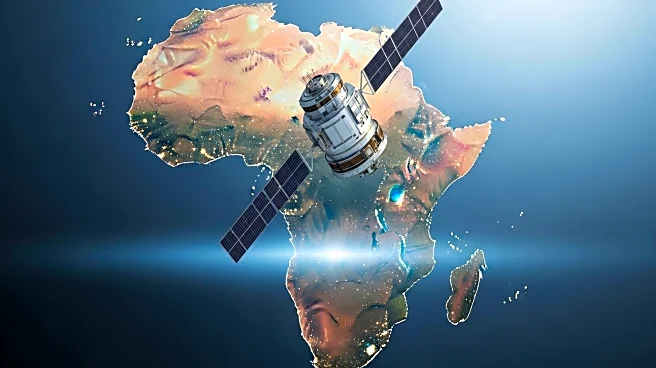What's Happening?
Africa is emerging as a new frontier in the global space race, with both China and the United States vying for influence. China has been actively building space alliances in Africa, enhancing its global surveillance network and aiming to become a dominant space power. This includes establishing facilities like a satellite lab in Egypt, where Chinese personnel work alongside local engineers. Meanwhile, there are calls within the U.S. to strengthen its space alliances with Africa, as the continent's space sector presents significant opportunities. However, the U.S. faces challenges in prioritizing these relationships, especially as it scales back aid to developing countries, potentially allowing China to position itself as Africa's key ally in space development. Africa itself is advancing its space capabilities, having established the African Space Agency (AfSA) to boost Earth observation and data sharing across the continent.
Why It's Important?
The development of Africa's space sector holds significant geopolitical implications. China's growing influence in Africa through space collaborations could shift the balance of power in global space exploration and surveillance capabilities. For the U.S., engaging with Africa's space initiatives could open new avenues for collaboration and technological exchange, potentially countering China's influence. The establishment of the African Space Agency marks a pivotal moment for the continent, signaling its commitment to space exploration and technological advancement. This development could lead to improved infrastructure, data sharing, and innovation across Africa, benefiting not only the continent but also global partners who engage with its space sector.
What's Next?
As Africa continues to develop its space capabilities, the U.S. and China are likely to intensify their efforts to establish stronger ties with African nations. The U.S. may need to adopt a more collaborative approach to fill gaps in its space coordination with Africa, potentially leading to new bilateral agreements and partnerships. Meanwhile, China's ongoing investments in African space infrastructure could further solidify its role as a key ally. The success of the African Space Agency will depend on its ability to coordinate efforts across the continent and leverage international partnerships to enhance its technological capabilities.
Beyond the Headlines
The rise of Africa's space sector could have long-term implications for global space policy and cooperation. As African nations gain more autonomy in space exploration, they may play a more significant role in international space governance and negotiations. This shift could lead to a more multipolar space environment, where emerging space powers like Africa influence global standards and practices. Additionally, the focus on space technology could drive educational and economic growth within Africa, fostering a new generation of scientists and engineers who contribute to the global space community.










